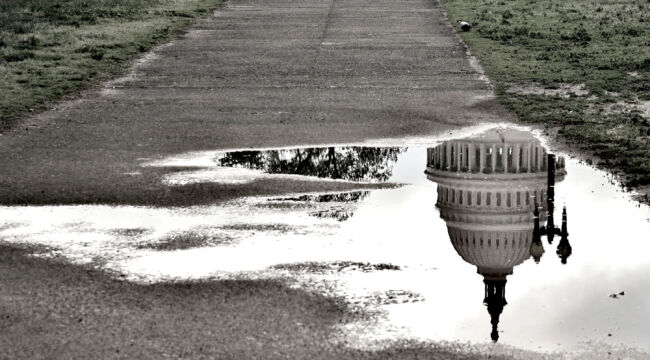Breaking the DC Swamp’s Laws
Gather around,
So you may hear,
Of the midnight tides,
Bringing black gold here.
Paraphrasing Henry Wadsworth Longfellow is a challenging task.
In Paul Revere’s Ride, Longfellow waxed lyrical about the greatest alarm bell ever rung.
Writing in 1860, on the eve of the Civil War, hoping to dissolve the tension, Longfellow noted that “hardly a man is now alive who remembers that famous day and year.”
That year was 1775.
Revere rode through Charlestown, Medford and then on through Lexington and Concord to warn the Americans that the British were coming!
One if by land, and two if by sea;
And I on the opposite shore will be,
Ready to ride and spread the alarm
Through every Middlesex village and farm,
For the country-folk to be up and to arm.
The poem is historically inaccurate. But with Longfellow’s poetic license, Revere became the ultimate messenger-warrior.
What about this poetic rendition of events that puffs out your chest, straightens your back, raises your chin and clenches your fists?
You may disagree. But I think it’s because Revere was a bad boy, shaking his fist at Mad King George III.
Summer Movie Season, 1988
I couldn’t wait to see Die Hard.
Moonlighting’s Bruce Willis, one of my favorite sitcom stars, finally hit the big time.
He was excellent with Cybill Shepherd. Funny, sarcastic, and whip-smart, Willis’ David Addison was a hoot in every episode.
But what would he be like on the big screen?
So many TV stars had tried to make the jump but failed. Would Willis be any different?
Sitting in my comfy seat with salty popcorn, Twizzlers, and a Coke, I remember being disappointed at what a dick John McClane was.
Grouchy, unhappy to be in California and downright ornery to his successful wife, I was surprised Willis even took the role.
But then… he appeared.
Hans Gruber. The greatest villain ever committed to film.
As I watched the movie, I questioned myself.
Why was I having these feelings?
Was I actually rooting for the bad guy?
Suave, debonair and urbane, Gruber didn’t move through scenes so much as glide through them.
He was the epitome of cosmopolitan, wore tailored suits, a trimmed beard and could speak multiple accents. (At the time, I had never heard of Alan Rickman… and didn’t know he was an Englishman playing a German!)
His wit, sarcasm and dialogue were as rich as a French gateau, compared to the Reese’s Pieces Hollywood had previously fed me.
Something had changed in me that day. Or, more precisely, activated a dormant gene.
I’d say it was lucky because I’d later find out girls preferred bad boys to good ones…
Why Do Girls Always Go for the Bad Boys?
In our late summer, autumn, or winter years, we rue the days when we didn’t know any better.
“If I knew then what I know now…” we often say as we lament our past indiscretions.
But Mark Twain had it right. We regret what we haven’t done far more than what we did.
And that leads me to the ladies.
So many women I’ve met in my life wanted a man who was just a bit naughty.
Not an evil man. Or an unjust man. And certainly not a bully.
But one who would break the rules when the rules didn’t — or shouldn’t — apply.
So, fine… I’d be a bit naughty.
Heck, @seaniechaos, my Twitter handle, is the nickname my old Kiwi girlfriend gave me in honor of our wild nights in London.
I wear that badge with honor nearly twenty years later.
As to my confusion, Jordan Peterson, a Canadian psychologist, professor and public intellectual, cleared it up for me.
Peterson called Beauty and the Beast a real female hero myth and used it to make his point. (And his point is, essentially, biology.)
Peterson says Beauty — Belle — is intelligent, resourceful and truthful… everything a man wants in a woman. But she doesn’t go for the psychopathic Gaston. She’s too smart for that.
Belle wants The Beast. The Beast is a terrible man… but he’s got potential.
He can guard the walls and make a safe haven for the children. The Beast is productive enough to be valuable and generous enough to share the proceeds of his endeavors with his family.
In short, women want their men to be dangerous, but dangerous on their behalf.
Paradoxically, this “bad boy” behavior is the way to preserve the family line. And that’s what the female wants.
The Beast Who Controls Himself
Again, women aren’t looking for evil men. Just naughty men. Ones who’ll break the rules when necessary to protect their family.
In an interview with Jocko Willink of Extreme Ownership fame, Peterson said this:
A good man is not a harmless man. A good man is a very, very dangerous man who has that under voluntary control.
Peterson’s point is that men incapable of cruelty aren’t fully formed. “Nice guys” who can’t contemplate cruelty are at the mercy of those who can. And that’s the most vulnerable someone can be.
The definition of Peterson’s “good man” describes many of our fictional heroes.
James Bond. Indiana Jones. Jack Aubrey. Jack Ryan. Rick Blaine.
And it probably describes your grandfather and your uncles. Maybe even your father. I know it describes mine.
That’s why we love and trust these men. That’s why we aspire to be like them.
What Does This Have to Do With Anything?
We had our editorial meeting yesterday and it went off on the most extraordinary tangent.
Paradigm Press VP Doug Hill asked the group about oil. Our good friend Byron King jumped in immediately to talk about it.
But it took a turn towards that black gold, from the country by the Black Sea, using a “shadow fleet,” as Byron called it, to keep the world economy afloat.
Like my 14-year-old self, I know I shouldn’t be rooting for the “bad guys” or the people “breaking the law” as set by the DC Swamp.
But I’m with Cicero, who once said, “The more laws, the less justice.”
There’s a difference between natural law (thou shalt not kill) and legislation (thou owe the military-industrial complex 39.6% of your income).
Cicero knew many laws do not necessarily guarantee true justice or a well-functioning legal system.
Instead, he suggested too many laws can lead to confusion, loopholes and a lack of clarity in applying justice. Simplicity, clarity, and fairness in legal systems are far better than an excessive and convoluted legal framework.
And when too many laws exist, black markets tend to form.
Black Markets
A black market is an illegal or unregulated market where goods or services are traded without government oversight or authorization. The wild west of commerce is where the forbidden fruit becomes the hot commodity.
Certain goods and services may be prohibited by law or heavily regulated, either due to safety concerns, ethical reasons, or simply the whims of a rogue government.
But there’s always someone willing to supply where there’s a demand, even if it means operating outside the boundaries of legality.
So, the black market steps in to fill the gaps.
It’s where you can find all sorts of illicit goodies, like illegal drugs, counterfeit products, smuggled weapons, endangered wildlife, pirated media, or even black gold.
In short, if there’s a law against it, you’ll likely find it thriving in the black market.
Why do black markets form?
Here are a few possibilities:
- Prohibition or Illegalization: When certain goods or services are prohibited or heavily regulated by the government, it creates a gap between the demand and the legal supply. Black markets thrive by providing access to prohibited or restricted items, such as illegal drugs, banned weapons, or counterfeit goods.
- Economic Factors: Economic disparities, high taxes, or excessive regulations can create an environment where legal markets become inaccessible or unaffordable for some individuals.
- Limited Supply or Scarce Resources: When essential commodities become scarce, black markets can arise to distribute goods in high demand but in short supply. This includes food shortages, fuel crises, or medical supplies during emergencies.
- Evading Taxes or Regulations: Some individuals or businesses evade taxes, regulations, or bureaucratic red tape. By operating outside the legal framework, they can avoid paying taxes, circumvent licensing requirements, or bypass costly compliance measures.
- Cultural or Social Factors: Cultural or social norms may clash with legal restrictions. This can be observed in gambling, sex work, or the trade of cultural artifacts, which are heavily regulated or considered illegal but still in demand.
- Failed Government Policies: In cases where government policies fail to address social or economic needs adequately, black markets can arise as a form of self-regulation or survival strategy.
Wrap Up
If you’ve been reading the Rude or the Reckoning for a while now, you know we are entirely against the USG and EU sanctions imposed on Russia. Not because we think Vlad Putin is a nice guy, but because we knew and called very early that the sanctions would hurt the US and EU citizenry and not Russia’s. And we were right from Day One.
These sanctions are what’s creating this incredible black market for black gold.
To be completely upfront, the people running these markets are probably “good men,” as we defined above.
It takes a lot to oppose the allegedly most powerful military and economy globally.
As someone in Europe paying top euro for gas, I’m grateful these black marketeers keep the prices lower than they would have been.
But over the next few weeks, Brian Maher, Byron King and I will look into the questions about the illicit oil trade here in the Old World. So keep watching out for the Rude and the Reckoning as we explore the topic more in-depth.
And if you have any of your own questions, be sure to email me here.
Have a lovely rest of your week!



Comments: